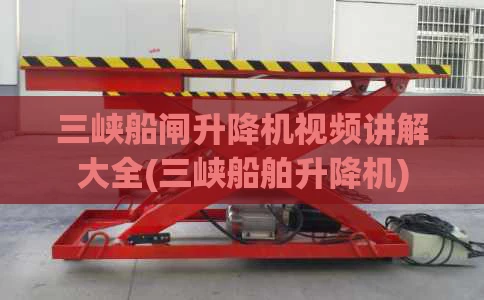三峡船闸升降机视频讲解大全(三峡船舶升降机)
- 家用电梯
- 2025-07-23
- 3
Flaunt or Flout?
“炫耀”还是“蔑视”?

To flaunt something is to display it ostentatiously. When people flaunt their wealth, they are showing off to impress others or make them envious. To flout something, such as a rule or a law, means to openly disregard it, often in a mocking or contemptuous fashion.
“flaunt”是指夸张展示。当人们炫耀自己的财富时,是希望给他人留下深刻印象,或让他们嫉妒。而“flout”,是指公然无视规则或法律,而且往往是用一种很嘲讽或轻蔑的方式。
Prescribe or Proscribe?
“开处方药”还是“剥夺权利”?
Prescribe means to authorize or establish something as a rule or a guide, such as when a doctor prescribes medication to a patient. Proscribe means to forbid, denounce, or condemn. Example: Smoking is proscribed in most government buildings; if you want to smoke, you have to step outside.
“prescribe”意味着授权或者建立起某种规则或方法,比如医生给患者开处方药的时候。而“proscribe”意味着禁止、废除或谴责。例如:在大多数政府大楼中禁止吸烟,如果你想吸烟,你就必须要出去。
Compliment or Complement?
“恭维”还是“补足”?
Compliment means to express praise or admiration. Complement means to add to something in a way that improves it, such as when an attractive scarf or necktie complements an outfit.
“Compliment”意思是表达赞美或者羡慕之情。“Complement”意思是给某物加上点什么让它变得更好,比如一条引人注意的围巾或项链可以“补足”一套搭配。
Ensure or Insure?
两个“确保”
Ensure and insure are largely interchangeable. Both mean “to make certain that something will happen.” Putting on a coat can both ensure and insure that you will be warm when you go outside. The words are not interchangeable where insurance policies are concerned: people can buy insurance, but they can’t buy ensurance.
Ensure和insure很大程度上可以互相替换。这两个都有“确保某事一定发生”的含义。出门的时候穿上外套可以“ensure”和“insure”你会很暖和。但这两个词在涉及到保险条款的时候不能互换,人们可以买“insurance(保险)”,但是不能买“ensurance”。
Discreet or Discrete?
“小心谨慎”还是“离散的”?
When someone is discreet, they are being cautious and showing good judgment. When something is discrete, it is separate and distinct from other things. The individual pieces of a jigsaw puzzle, for example, are discrete objects that are placed together to complete the puzzle.
当一个人是“discreet”的时候,他们会小心翼翼,拥有良好的判断力。当一个东西是“discrete”的时候,它是分离的和独立于其他事物的。拼图玩具的每一块,都是“discrete”的物体,只有放在一起才能完成整个拼图。
Council or Counsel?
“委员会”还是“提出忠告”?
A council is a group of people who serve as administrators or advisers. To counsel someone means to give them advice or to recommend a course of action. In the legal profession, attorneys on opposing sides of a court case are called counsels for the prosecution and for the defense. The advice given can also be referred to as counsel.
“council”是由一群管理者或顾问组成的团体。而“counsel”某人意思是给他们建议,或者推荐怎么做。从专业法律上讲,法庭上对立两边的辩护律师被称作是起诉方和辩护方的“counsel(法律顾问,此处为名词含义)”。提出的建议也可以被称为“counsel(忠告)”。【看不太明白的可以自行查字典】
Adverse or Averse?
“不利的”还是“反对的”?
Adverse means “harmful, unfavorable, or inhibiting success,” and is applied to situations or conditions. Prolonged drought, for example, has an adverse effect on crop yields. Averse means “opposing or having a strong dislike,” and usually describes someone’s attitude. A person’s shyness makes them averse to reading their own writing aloud.
“adverse”意思是“有害的、令人不快的、妨碍成功的”,并被用来描述状况和情形。举个例子,长时间的干旱对谷物收成有着“adverse”的影响。而“averse”意思是“相对立或者有着很大的不满”,而且通常用来描述某人的态度。一个人的害羞会让他们“averse to(不愿意)”大声念出自己写的东西。
Precipitate or Precipitous?
“使促成”还是“陡峭的”?
Precipitate can mean to cause something to happen suddenly or prematurely—the spilled drink precipitated a barroom brawl. It can also refer to rain. Precipitous, on the other hand, means steep. Example: In 2008 there was a precipitous drop in U.S. home sales.
“precipitate”意思是使什么事情突然或比预期早地发生。如,那瓶洒了的饮料引发了一场突如其来的酒吧斗殴。“precipitous”则意味着陡峭的。如,2008年,美国国内销售额下滑得非常厉害。
Auger or Augur?
“木钻”还是“预言”?
An auger is a tool similar to a drill that is used to bore holes in wood, ice, dirt, or some other substance. Augurs were ancient Roman priests who studied natural phenomena (especially the flight of birds) for signs indicating whether the gods approved or disapproved of human activities. If such signs did not augur well for an upcoming battle, election, or some other planned action, it could be delayed or canceled until the gods were in a better mood.
“auger”是一个类似钻头的工具,可以在木头,冰块,泥土和其他材质上钻孔。而“augur”是古罗马祭祀研究了自然现象(尤其是鸟儿的飞行)之后得出的神是否支持人类活动的结论。如果“augur(占卜)”了即将发生的战斗、选举或其他有计划的行动之后,显示出不好的征兆,那这项活动通常会被推迟或者取消,直到神的心情好一些之后再做。
Enormity or Enormousness?
“暴行”还是“巨大的”?
Enormity refers to the large scale of something evil or morally wrong, such as the enormity of a murderer’s crimes. If you’re describing the giant size of something in a context where no negative moral judgment is implied, believe it or not, the correct word to use is enormousness (or, if that sounds too weird, immensity).
“enormity”是指极大的罪恶或者道德错误,如,一个谋杀者真是罪大恶极。如果你在一个非负面的语境中想形容一个东西有多大,那么信不信由你,正确的使用方法应该是用“enormousness”。(如果你觉得这个词太怪了,也可以用immensity))
Though it’s common for people to use the word enormity in a neutral context—“the enormity of the task at hand,” for example—purists consider this usage to be incorrect.
虽然人们在中性语境中也经常用“enormity”这个词。如“手头的工作真多”,但语法纯粹主义者们坚持这种用法是错误的。
阅读原文阅读
加载中